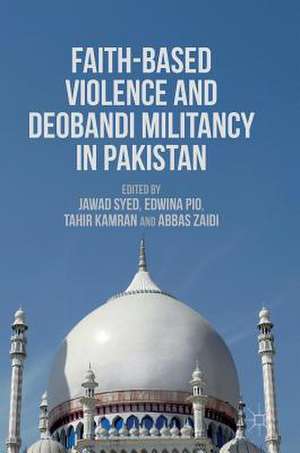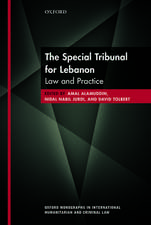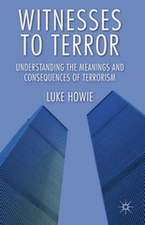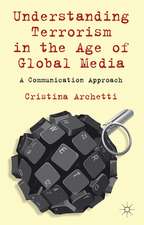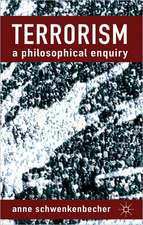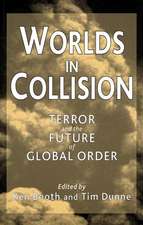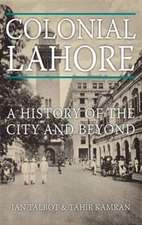Faith-Based Violence and Deobandi Militancy in Pakistan
Editat de Jawad Syed, Edwina Pio, Tahir Kamran, Abbas Zaidien Limba Engleză Hardback – 22 noi 2016
| Toate formatele și edițiile | Preț | Express |
|---|---|---|
| Paperback (1) | 953.35 lei 43-57 zile | |
| Palgrave Macmillan UK – 27 iun 2018 | 953.35 lei 43-57 zile | |
| Hardback (1) | 958.07 lei 43-57 zile | |
| Palgrave Macmillan UK – 22 noi 2016 | 958.07 lei 43-57 zile |
Preț: 958.07 lei
Preț vechi: 1168.38 lei
-18% Nou
Puncte Express: 1437
Preț estimativ în valută:
183.32€ • 191.92$ • 151.69£
183.32€ • 191.92$ • 151.69£
Carte tipărită la comandă
Livrare economică 07-21 aprilie
Preluare comenzi: 021 569.72.76
Specificații
ISBN-13: 9781349949656
ISBN-10: 1349949655
Pagini: 546
Ilustrații: XXI, 546 p.
Dimensiuni: 148 x 210 x 37 mm
Greutate: 0.81 kg
Ediția:1st ed. 2016
Editura: Palgrave Macmillan UK
Colecția Palgrave Macmillan
Locul publicării:London, United Kingdom
ISBN-10: 1349949655
Pagini: 546
Ilustrații: XXI, 546 p.
Dimensiuni: 148 x 210 x 37 mm
Greutate: 0.81 kg
Ediția:1st ed. 2016
Editura: Palgrave Macmillan UK
Colecția Palgrave Macmillan
Locul publicării:London, United Kingdom
Cuprins
Introduction.- 1 Contextualising the ascendancy of the Deobandis in Pakistan.- 2 Historical Roots of Deobandi Version of Jihadism: Implications for Violence in Pakistan.- 3 History of militancy in Islam: From Khawarij to Takfiri Deobandism.- 4 Ideological sources of transnational Islamist terrorism.- 5 Discourses of hate in Deobandi curricula, fatwas and books.- 6 Blasphemy, Takfeer, Jihad and Khilafat.- 7 Deobandi roots of extremist violence in Pakistan.- 8 Role of Deobandi extremism in global Salafi Wahabi terrorism.- 9 Could Pakistan have remained pluralistic?.- 10 Media analysis.- 11 Violence against Sunni Sufis and Barelvis.- 12 Violence against Shias; Shia genocide.- 13 Violence against Christians, Hindus, Sikhs, Jews and other communities.- 14 Violence against Ahmadis.- 15 Deobandi militancy in Bangladesh.- 16 Fighting The Takfiris: Pan Islamic Mobilization. Against Militant Anti-Shia Rhetoric inthe USA.- 17 Fanning the Flames: Deobandi Influence within British Islamism.- 18 Intersectionality.- 19 Counter-terrorism and Reform
Notă biografică
Jawad Syed, PhD, is Professor of Organisational Behaviour and Diversity Management at the University of Huddersfield, UK. He is the founder and co-director of the Global Centre for Equality and Human Rights (GCEHR), UK. He is also a programme chair of the Gender, Race and Diversity in Organisations SIG of the European Academy of Management.
Edwina Pio (PhD, BEd, MNZAC) is Professor of Diversity at the Business & Law School, Auckland University of Technology, New Zealand, and is Visiting Professor at Boston College, USA. She is co-director of the Global Centre for Equality and Human Rights (GCEHR), UK.
Tahir Kamran, PhD, is Professor and Head of the Department of History at Government College University Lahore, Pakistan, where he founded the biannual journal The Historian. From 2013-2015, he was Iqbal Fellow at the University of Cambridge, UK, as Professor in the Centre of South Asian Studies.
Abbas Zaidi is Tutor in Media Studies at the School of the Arts & Media, University of New South Wales, Australia. He has worked as a journalist and teacher in Pakistan, Brunei Darussalam, and Australia.
Edwina Pio (PhD, BEd, MNZAC) is Professor of Diversity at the Business & Law School, Auckland University of Technology, New Zealand, and is Visiting Professor at Boston College, USA. She is co-director of the Global Centre for Equality and Human Rights (GCEHR), UK.
Tahir Kamran, PhD, is Professor and Head of the Department of History at Government College University Lahore, Pakistan, where he founded the biannual journal The Historian. From 2013-2015, he was Iqbal Fellow at the University of Cambridge, UK, as Professor in the Centre of South Asian Studies.
Abbas Zaidi is Tutor in Media Studies at the School of the Arts & Media, University of New South Wales, Australia. He has worked as a journalist and teacher in Pakistan, Brunei Darussalam, and Australia.
Textul de pe ultima copertă
‘The contributions to this valuable collection provide useful insight into the background of “faith-based militancy and terrorism in Pakistan and across the globe,” distinguishing crucially the Deobandi dimension of radical Islam that has been fostered by Saudi Arabia, with US support in Pakistan particularly in the 1980s during the harsh and brutal Zia-ul-Haq regime. These developments pose a severe threat to Islamic society and beyond, and merit careful attention by those who hope to understand today’s complex and dangerous world.’
-Professor Noam Chomsky, Massachusetts Institute of Technology, USA
‘This is a most timely volume which provides historical depth and nuance to the understanding of Islamic militancy and violence in Pakistan. Such an awareness is often lacking in contemporary analyses. The empirical data provided in a series of incisive and insightful chapters enables an informed account to emerge of the causes and consequences of the growing influence of Deobandi Islam within the country and its transnational linkages. The volume enables the reader to grasp the complex factors which reduce the space for pluralism, despite inherited traditions of tolerance. The book is a must read for everyone seeking to understand contemporary Pakistan and to assess its future trajectory.’
-Professor Ian Talbot, University of Southampton, UK
‘There has long been a need for a study tracing the development of Deobandi school of thought in the South Asian subcontinent in both the colonial and the post-colonial eras. ‘Faith-Based Violence and Deobandi Militancy in Pakistan’ will fill this lacuna through an inter-disciplinary and historically informed study of Deobandi thinking and organization.’
-Professor Ayesha Jalal, Tufts University, USA
‘This book is a landmark in scholarship on Islam, Pakistan and militancy. It will provide necessary insights into the genesis of violence in the name of religion and sect which scholars, ordinary readers and decision-makers can use to understand why Pakistan's name is often in the headlines for the wrong reasons.’ -Professor Tariq Rahman, Beaconhouse National University, Lahore, Pakistan
This book documents and highlights the Deobandi dimension of extremism and its implications for faith-based violence and terrorism. This dimension of radical Islam remains largely ignored or misunderstood in mainstream media and academic scholarship. The book addresses this gap. It also covers the Deobandi diaspora in the West and other countries and the role of its radical elements in transnational incidents of violence and terrorism. The specific identification of the radical Deobandi and Salafi identity of militants is useful to isolate them from the majority of peaceful Sunni and Shia Muslims. Such identification provides direction to governmental resources so they focus on those outfits, mosques, madrassas, charities, media and social medial channels that areassociated with these ideologies. This book comes along at a time when there is a dire need for alternative and contextual discourses on terrorism.
Jawad Syed, PhD, is Professor of Organisational Behaviour and Diversity Management at the University of Huddersfield, UK. He is the founder and co-director of the Global Centre for Equality and Human Rights (GCEHR), UK. He is also a programme chair of the Gender, Race and Diversity in Organisations SIG of the European Academy of Management.
Edwina Pio (PhD, BEd, MNZAC) is Professor of Diversity at the Business & Law School, Auckland University of Technology, New Zealand, and is Visiting Professor at Boston College, USA. She is co-director of the Global Centre for Equality and Human Rights (GCEHR), UK.
Tahir Kamran, PhD, is Professor and Head of the Department of History at Government College University Lahore, Pakistan, where he founded the biannual journal The Historian. From 2013-2015, he was IqbalFellow at the University of Cambridge, UK, as Professor in the Centre of South Asian Studies.
Abbas Zaidi is Tutor in Media Studies at the School of the Arts & Media, University of New South Wales, Australia. He has worked as a journalist and teacher in Pakistan, Brunei Darussalam, and Australia.
-Professor Noam Chomsky, Massachusetts Institute of Technology, USA
‘This is a most timely volume which provides historical depth and nuance to the understanding of Islamic militancy and violence in Pakistan. Such an awareness is often lacking in contemporary analyses. The empirical data provided in a series of incisive and insightful chapters enables an informed account to emerge of the causes and consequences of the growing influence of Deobandi Islam within the country and its transnational linkages. The volume enables the reader to grasp the complex factors which reduce the space for pluralism, despite inherited traditions of tolerance. The book is a must read for everyone seeking to understand contemporary Pakistan and to assess its future trajectory.’
-Professor Ian Talbot, University of Southampton, UK
‘There has long been a need for a study tracing the development of Deobandi school of thought in the South Asian subcontinent in both the colonial and the post-colonial eras. ‘Faith-Based Violence and Deobandi Militancy in Pakistan’ will fill this lacuna through an inter-disciplinary and historically informed study of Deobandi thinking and organization.’
-Professor Ayesha Jalal, Tufts University, USA
‘This book is a landmark in scholarship on Islam, Pakistan and militancy. It will provide necessary insights into the genesis of violence in the name of religion and sect which scholars, ordinary readers and decision-makers can use to understand why Pakistan's name is often in the headlines for the wrong reasons.’ -Professor Tariq Rahman, Beaconhouse National University, Lahore, Pakistan
This book documents and highlights the Deobandi dimension of extremism and its implications for faith-based violence and terrorism. This dimension of radical Islam remains largely ignored or misunderstood in mainstream media and academic scholarship. The book addresses this gap. It also covers the Deobandi diaspora in the West and other countries and the role of its radical elements in transnational incidents of violence and terrorism. The specific identification of the radical Deobandi and Salafi identity of militants is useful to isolate them from the majority of peaceful Sunni and Shia Muslims. Such identification provides direction to governmental resources so they focus on those outfits, mosques, madrassas, charities, media and social medial channels that areassociated with these ideologies. This book comes along at a time when there is a dire need for alternative and contextual discourses on terrorism.
Jawad Syed, PhD, is Professor of Organisational Behaviour and Diversity Management at the University of Huddersfield, UK. He is the founder and co-director of the Global Centre for Equality and Human Rights (GCEHR), UK. He is also a programme chair of the Gender, Race and Diversity in Organisations SIG of the European Academy of Management.
Edwina Pio (PhD, BEd, MNZAC) is Professor of Diversity at the Business & Law School, Auckland University of Technology, New Zealand, and is Visiting Professor at Boston College, USA. She is co-director of the Global Centre for Equality and Human Rights (GCEHR), UK.
Tahir Kamran, PhD, is Professor and Head of the Department of History at Government College University Lahore, Pakistan, where he founded the biannual journal The Historian. From 2013-2015, he was IqbalFellow at the University of Cambridge, UK, as Professor in the Centre of South Asian Studies.
Abbas Zaidi is Tutor in Media Studies at the School of the Arts & Media, University of New South Wales, Australia. He has worked as a journalist and teacher in Pakistan, Brunei Darussalam, and Australia.
Caracteristici
Provides an essential guide and reference text on faith-based militancy and terrorism in Pakistan and across the globe Develops and synthesizes academic research on the topic of faith-based violence and terrorism and highlights the multi-level challenges facing the persecuted communities along societal, economic, political and individual dimensions Speaks to governmental and international organisations, human rights groups and the media
